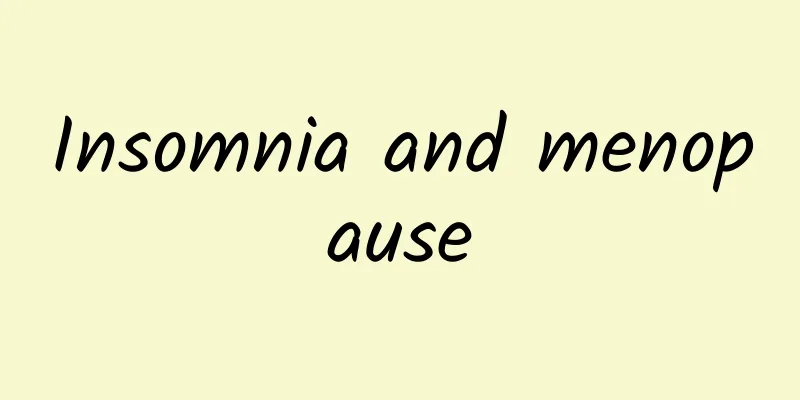Insomnia and menopause

|
Author: Xia Zhong, Chief Physician of Wuhu Fourth People's Hospital Reviewer: Cheng Wanliang, Chief Physician, Wuhu Fourth People's Hospital In the sleep clinic, some women around 50 years old often ask this question: "Is insomnia caused by menopause?" These patients suffer from insomnia and cannot find the real reason. They are in the menopausal stage and are even more anxious. They urgently need to get the right answer. 1. Is insomnia caused by menopause? Insomnia is a comprehensive problem. Many factors can affect the quality of sleep and directly or indirectly become the "culprit" of insomnia, including physiological factors, psychological factors, social factors, etc. 1. Physiological factors : As people age, their sleep duration changes. From middle age, sleep duration starts to shorten (usually around 7 hours), deep sleep duration becomes shorter and shorter, while light sleep becomes longer and longer, and the incidence of insomnia increases. Some physical diseases are often accompanied by insomnia, such as chronic obstructive pulmonary disease, stroke, diabetes, etc. Some disease symptoms also have a great impact on sleep, such as joint pain, migraine, skin itching, etc. 2. Psychological factors : Emotional disorders have a great impact on sleep, such as anxiety and depression. Clinically, many patients with anxiety and depression cannot "at the first time" realize that they have emotional problems. At first, they often complain of insomnia and keep looking for various "sleep remedies". Therefore, sleep problems have been difficult to completely solve. Some patients have gradually realized that insomnia is caused by emotional disorders after a long period of treatment and constant reminders from doctors. 3. Social factors : People who experience major life events often have short-term sleep problems. If they are under long-term stress, such as constantly worrying about their children’s work and marriage problems, heavy housework, and caring for sick elderly people, their sleep quality may be affected, leading to insomnia. Therefore, whether insomnia is caused by menopause requires a careful doctor's consultation, combined with clinical manifestations and corresponding examinations before an answer can be given. Figure 1 Copyright image, no permission to reprint 2. What are the effects of menopause on sleep? Menopause refers to the transitional period between sexual maturity and old age. It generally occurs in women between the ages of 45 and 55, and is divided into premenopause, menopause, and postmenopause. Some women in menopause will experience symptoms of varying severity, the most typical of which are hot flashes, flushing, and sweating. They may also experience anxiety, depression, and irritability. Reports show that the proportion of insomnia in menopausal women is as high as 65.1%, with the main manifestations being difficulty falling asleep, half asleep, dreaming, and even nightmares, easy awakening, inability to fall asleep again after waking up, early awakening, and fatigue after waking up. Inappropriate coping methods, poor sleep hygiene habits, and increased anxiety make insomnia chronic. Studies have shown that the body temperature of insomnia patients drops three hours later at night than that of normal sleepers, making it more difficult for them to fall asleep; the body temperature of patients with sleep maintenance disorders drops less than that of normal sleepers, so it is difficult for them to sleep deeply. 3. How to improve sleep 1. Develop good sleeping habits : go to bed on time every day and gradually form a regular sleep schedule; avoid looking at your phone for a long time before going to bed to reduce blue light stimulation; do not watch short videos or live broadcasts after going to bed to avoid abnormal excitement of the brain; wear breathable, sweat-absorbent cotton clothes when sleeping, or clothes that can quickly wick away sweat and stay dry to reduce discomfort caused by sweating. 2. Develop good eating habits : Avoid drinking stimulant drinks such as coffee and milk tea in the afternoon, and avoid smoking and drinking; avoid eating difficult-to-digest food for dinner, and drink at least 6 to 8 glasses of water every day. Sufficient water can relieve hot flashes and avoid poor sleep quality due to dryness and heat. Reduce fluid intake 2 hours before bedtime to reduce the impact of urination on sleep, which can relieve insomnia to a certain extent. 3. Insist on outdoor exercise : Increase the time of outdoor activities during the day, get more sunlight, and keep the indoor light dim before going to bed at night, which is conducive to the regulation of the biological clock and deeper sleep. Exercise of a certain intensity and duration can improve anxiety, help menopausal women actively cope with stress, and relieve insomnia to a certain extent, but be careful to avoid strenuous exercise 3 hours before going to bed. Figure 2 Copyright image, no permission to reprint 4. Self-regulation : When you are upset and can't sleep, you can improve it through self-regulation, such as talking and communicating with your family to distract your attention. Before going to bed, you can listen to soothing music and meditate to help you fall asleep; you can also soak your feet or take a hot bath to raise your body temperature and then gradually lower it to fall asleep quickly. 5. Social support : Menopausal women may also be troubled by family problems, lack of work ability and other factors, which may aggravate physical discomfort and persist insomnia. Therefore, families and society need to pay active attention to the menopausal women group and help them through this stage. 6. Psychotherapy : If you feel that you are under too much psychological pressure and cannot adjust on your own, you should seek psychotherapy from a professional, correctly understand your mental state, eliminate negative emotions such as tension and anxiety, and face problems with a positive and relaxed attitude, so as to improve your sleep quality. 7. Drug treatment : If the symptoms of insomnia are severe and do not improve for a long time, do not be afraid to see a doctor. You can take some sedative hypnotics or anti-anxiety drugs under the guidance of a professional doctor to quickly relieve symptoms and regain confidence in sleep. References [1] Chinese Society of Preventive Medicine, Menopause Health Care Branch, Chinese Society for the Promotion of Human Health Science and Technology, Gynecological Endocrinology and Fertility Promotion Committee, Beijing Society of Integrated Traditional Chinese and Western Medicine, Menopause Committee. Chinese expert consensus on the clinical management of menopausal insomnia[J]. Chinese General Practice, 2023, 26(24): 2951-2958. |
<<: Can you live without blood? The reason is this - taking you closer to hyperbaric oxygen
>>: Popular Science Illustrations | Technology Opens Up New Ideas for Diabetes Treatment
Recommend
Does morning sickness mean the fetus is healthy?
If you want to become a qualified mother, you mus...
What causes lower abdominal pain during menstruation?
Lower abdominal pain during menstruation is anoth...
How many hours does it take to charge the water replenisher for the first time? What should I pay attention to when using the water replenisher?
Generally speaking, a hydrating device can be ful...
Why does my period come a few days earlier every month?
Menstruation coming a few days early every month ...
Reveal the truth | Is drinking tea or coffee good for your heart?
Coffee and tea are among the most popular beverag...
Brown discharge in early pregnancy
In the early stages of pregnancy, every pregnant ...
Which is healthier for women: menopause at 40 or 50? Be careful if you go through menopause later than this age
Recently, the topic of "premature ovarian fa...
What causes cloudy urine in pregnant women?
A woman's body will undergo great changes aft...
What does it mean to dream that you are pregnant?
What does it mean to dream that you are pregnant?...
Where do cervical polyps grow?
Many female infertility problems are caused by ut...
What to do if your breasts swell and hurt 10 days before your period
Some women will experience bloating and pain befo...
How to determine the order of applying makeup cream and primer?
Modern women attach great importance to their app...
How much does labia surgery cost?
In their daily lives, some women who pursue beaut...
6 Chinese medicine prescriptions for treating dysmenorrhea
Menstrual cramps are a very common symptom. Women...
Is it good to hold the baby often? What will happen to the baby who is not held after birth?
After the baby is born, is there any obvious diff...









